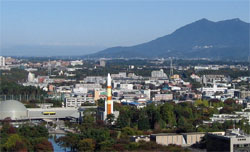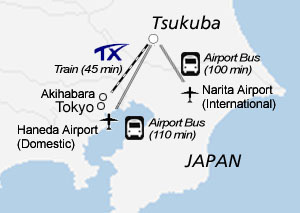Travel Information
Access to Tsukuba City and Conference Venue 21st International Conference on Pattern Recognition (ICPR2012) |
 Tsukuba is a unique science city, located approximately 50 kilometers from Tokyo, and 40 kilometers from Narita International Airport. Situated in the fertile flat lands of the Kanto Plain, the city is surrounded by a rich natural environment, with the well-known Mount Tsukuba to the north, and to the east, Kasumigaura, the second largest lake in Japan. In 2005, new metropolitan railway “Tsukuba Express” linking between Akihabara and Tsukuba in 45 minutes, makes frequent access from Tokyo.
Tsukuba is a unique science city, located approximately 50 kilometers from Tokyo, and 40 kilometers from Narita International Airport. Situated in the fertile flat lands of the Kanto Plain, the city is surrounded by a rich natural environment, with the well-known Mount Tsukuba to the north, and to the east, Kasumigaura, the second largest lake in Japan. In 2005, new metropolitan railway “Tsukuba Express” linking between Akihabara and Tsukuba in 45 minutes, makes frequent access from Tokyo.
* See the Venue page for the details of conference site.
Directions To Tsukuba
From Narita Airport (Int'l)
 Train
Train
Narita Airport Station -[Keisei Skyliner]- Nippori Station -[JR Yamanote Line]- Akihabara Station -[Tsukuba Express (TX)]- Tsukuba Station
Bus (Airport Liner NATT's)
Take the Tsukuba-Narita Airport Bus from Narita Airport to Tsukuba Center.
Time: Approx. 100 min
Cost: 2540 JPY (adult), 1270 JPY (child)
Taxi
The airport is about 40km from Tsukuba, so you can take a taxi, but it will be expensive.
Time: Approx. 60 min
Cost: Likely at least 12,000 JPY
From Haneda Airport (Domestic & International)
Train
Haneda Airport Stations -[Tokyo Monorail]- Hamamatsu-cho -[JR Yamanote Line]- Akihabara Station -[Tsukuba Express (TX)]- Tsukuba Station
Bus (Haneda Limousine Bus)
Take the Tsukuba-Haneda Airport Bus from Heneda Airport to Tsukuba Center.
Time: 80-110 minutes to Tsukuba depends on traffic.
Cost: 1,800 JPY (adult), 900 JPY (child)
Taxi
The airport is about 60km from Tsukuba, so you can take a taxi, but it will be expensive.
Time: Approx. 80 min
Cost: Likely at least 16,000 JPY
From Tokyo Area
From Tokyo Station
Train (Yamanote line and Tsukuba Express)
Take Yamanote line from Tokyo station to Akihabara station, Then take Tsukuba Express from Akihabara to Tsukuba.
Time: 50 min to 62 min depending on speed of train
Cost: about 1,300 JPY
Bus (Joban Express)
Take Joban Express bus from the Yaesu South exit of Tokyo Station to Tsukuba Center.
Time: Approx. 80 min
Cost: 1,250 JPY
Hyperdia: Timetable and Route Search A service which offers the route and the timetable of the railway and the aviation of Japan. |
|---|
Travel Information
- Weather
In November it is cold in Tsukuba and most areas in Japan. The average highest temperature in a day in Tsukuba is around 15.9 °C and the lowest is around 4.6 °C.
- Lunch/Meals
Lunch during the period of ICPR2012 will not be supplied. However, there are a variety of nice restaurants within walking distance from conference site. ?A restaurant map will be available. And you can get lunch box (Bento) when you buy lunch tickets on ahead only. "Bento" is a very common and popular Japanese boxed lunch served every day in Japan. (Cancelled)
-
Electricity
 Electric power supply is 100V/50Hz in Eastern Japan including Tsukuba and Tokyo.? Japanese power outlets are physically identical to 2-flat-pin North American outlets (Type A). Some North American devices will work fine in Japan without plug adapter, however, some sensitive devices may not work properly or even get damaged. (Photo: Japanese 2-flat-pin plug (Type A))
Electric power supply is 100V/50Hz in Eastern Japan including Tsukuba and Tokyo.? Japanese power outlets are physically identical to 2-flat-pin North American outlets (Type A). Some North American devices will work fine in Japan without plug adapter, however, some sensitive devices may not work properly or even get damaged. (Photo: Japanese 2-flat-pin plug (Type A))
- Network
Wireless LAN can be used in the Main Convention Hall, Conferemce Rooms and Entrance Hall (Lobby).
- Video filming and photos
During the ICPR2012 program there will be video filming and photo shoot. The video clips and photographs are going to be recorded and used for publicity, PR pamphlets, data and Host Institutes web pages. Report to the ICPR2012 organizer if you have any problem with this.
Tsukuba Science City
“Tsukuba Science City” refers to the whole area of Tsukuba City consisting of two major districts: The “Research and Education District” refers to the masterly designed and developed district combining research and educational organizations with residences and public facilities (approximately 2,700 ha. in area) as a whole. The rest (approximately 25,700 ha. in area) is called the “Surrounding Development District”.
Tsukuba Science City is home to around 30% of Japan’s public research institutions as well as many private research institutes in the surrounding R & D oriented industrial parks. At present, over 300 public and private research institutions and diverse companies are actively engaged in their respective activities, making Tsukuba significantly important for Japan, one of the world’s leading countries in science and technology.
(Links) Tsukuba Science City Network






